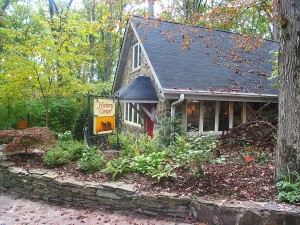
JCCFS History Center
Over the last 10 years I have taken four weeklong classes at the John C. Campbell Folk School. I learned to throw clay on a wheel, took two weaving classes and, in June, I took a bark and vine basketry class with Asheville, NC basketry artist, Matt Tommey (www.matttommey.com). I relocated to Sonoma County in 2014 and wanted to take advantage of the grape vines available to learn to make baskets. Stefany Perlman of the Redwood Guild of Fiber Arts taught me the basics of basket weaving before I attended the bark and vine class with Matt Tommey.
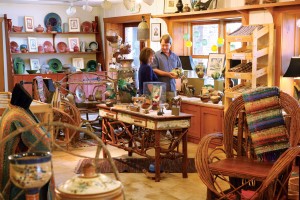
JCCFS Craft Shop
The John C. Campbell Folk School was founded in 1925 by Olive Dame Campbell and Marguerite Butler modeling the Danish “folk high school” concept. As the history of the Folk School notes, in the early 1900s John C. and Olive Campbell were idealistic young adults from New England who traveled through the south studying mountain life. Both hoped that the quality of life of the residents in Appalachia could be “improved by education, and in turn wanted to preserve and share with the rest of the world the wonderful crafts, techniques, and tools that the mountain people used in everyday life”. In collaboration with the people of western North Carolina who contributed land, labor, and building materials, Ms. Campbell and Ms. Butler established the Folk School in Brasstown, NC .
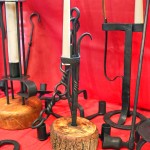
Blacksmithing
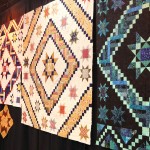
Quilts
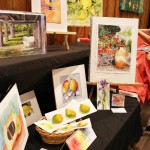
Watercolors
The Folk School offers weekend and weeklong classes. The weekend classes kickoff on Friday afternoon with registration/orientation and end after lunch on Sunday. The students taking the weeklong classes arrive on Sunday afternoon and depart the following Saturday morning. Each day at the Folk School starts with a ‘morning song’ performed by an instructor or staff or a morning walk on the campus, and each delicious home-style meal starts with a song or poem. Students can attend nightly demonstrations by instructors teaching other classes. The Student Exhibit at the end of the week highlights the skill and crafts the students have learned. The accommodations at the Folk School include two six-bed dormitories (one each for men and women) and fourteen buildings and a campground, offering a variety of sleeping arrangements from private room/bath, shared rooms/bath, and camping.
Pam Howard, Resident Weaver, and assistant weaver Dianne Totten, were instructors for both weaving classes I took. Pam has been weaving for 32 years on floor looms and has been Resident Weaver at the Folk School for 16 years. Pam organizes the classes (beginner, advanced classes, rag rug, rigid heddle, inkle and more) , she recruits the instructors, keeps the looms in working order, purchases materials and books for the extensive fiber arts library so that all the students need to do “is bring a smile”. Pam reinforces the Folk School’s philosophy that “it’s all about the process, not the product” so learning to thread the loom is more important than making a product (but I have to say that I have beautiful samplers and scarves from the weaving classes I took with her).
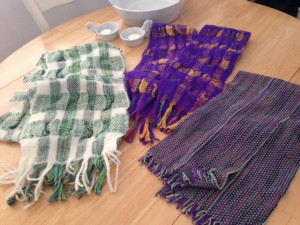
Terry’s scarves
There are twenty-six floor looms in the weaving studio. The looms range from Baby/Mighty Wolfs and MacCombers to assorted small looms and they are for students with no weaving experience as well as advanced weavers – all learning new techniques with rainbow colors and fibers of different textures. All this in a beautiful natural setting in western North Carolina. The John C. Campbell Folk School (www.folkschool.org) offers more than 800 weeklong and weekend adult classes a year in a variety of arts and crafts from basketry, blacksmithing to making dulcimers to woodturning and writing. The classes are for adults with two weeks in the summer for children and their parents, grandparent or other legal adult guardian.
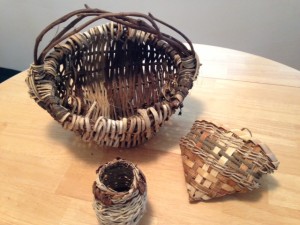
Terry’s baskets
At the Folk School I have met enthusiastic adult learners interested in the native arts and crafts of the Appalachia mountains. I have met instructors with the patience to teach adult beginners crafts that will bring joy and fulfillment while ensuring that more advanced students learn new techniques. The John C. Campbell Folk School has the largest program of its type in the country, with the most class offerings year-round. I can’t wait to return to Folk School. What shall I take next? Hand felting, dyeing, paper art, knitting or………..
Note: Dianne Totten will be teaching classes in crimp cloth in northern California in the fall of 2016 including at the Redwood Guild of Fiber Arts. Her technique for crimp cloth is featured in the May/June 2015 issue of Handwoven Magazine.